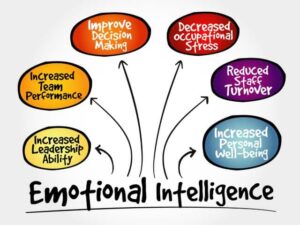Become a Better Leader by Improving Your Emotional Intelligence
Posted on December 7, 2018

Within each of these categories are skills leaders can use to teach, engage, guide and support their teams.
When leaders understand their own constellation of strengths and weaknesses in emotional intelligence, they can spot ways to improve their own leadership.
Four ways to improve your emotional intelligence:
1. Self-Awareness
Awareness of one’s own emotional state is key to strong emotional intelligence. Practice self-awareness by asking yourself several times a day, “What am I feeling right now?” Spend a moment feeling the emotion, then return to work.
This practice, repeated over time, sharpens the ability to create mental distance between yourself and your feelings. It allows you to consider your feelings as information in any setting, without letting those feelings dictate your response to that situation.
2. Self-Management
The self-management aspect of emotional intelligence includes skills like emotional self-control, adaptability, achievement orientation and a positive outlook. Often, these skills are also described with the term “growth mindset,” or an approach that assumes skills can be learned and challenges overcome.
To develop self-management skills, check in with your own orientation to work several times a day. Ask yourself, “What else could I do in this situation?” This question trains your mind to explore possibilities and to see yourself as capable of choice and change.
3. Social Awareness
Social awareness skills focus on your place as it relates to those around you. These skills include empathy and organizational awareness.
To practice empathy, try to see situations from another person’s perspective. For instance, if two team members are in conflict, picture yourself in each person’s position. You aren’t required to agree with the actions that person took; the goal is to understand why each person’s response seemed like an option to them in the moment.
Organizational awareness orients you and your team within the company. It includes understanding the overall mission and goals, as well as the individual personalities that make decisions and drive progress. Here, doing your own homework and keeping an open mind is a must; relying on gossip or predetermined notions about others will lead you astray.
4. Relationship Management
Relationship management skills consist of several traditional “manager” skills, including the ability to influence, mentor and inspire others, manage conflict, and work as part of a team.
Since these skills are often seen as “management” skills, many classes and seminars teach leaders how to use them more effectively. Building up your skills in the other three categories is a must as well. Leaders who can put their own emotions in perspective, who seek opportunities, and who practice empathy find it easier to mentor, address conflict and provide the inspiration their team needs at key moments.
How TERRA Can Help
The recruiters at TERRA Staffing strive to help our clients build outstanding teams. To learn more about our services, contact our recruiters today.
We have offices in Seattle, Portland and Phoenix and our expert recruiters are ready to help.
Categories: Employee Engagement Ideas, HR and Management Advice
Tags: Emotional Intelligence and Leadership, Emotional Intelligence at Work, The Importance of Emotional Intelligence in Leadership





